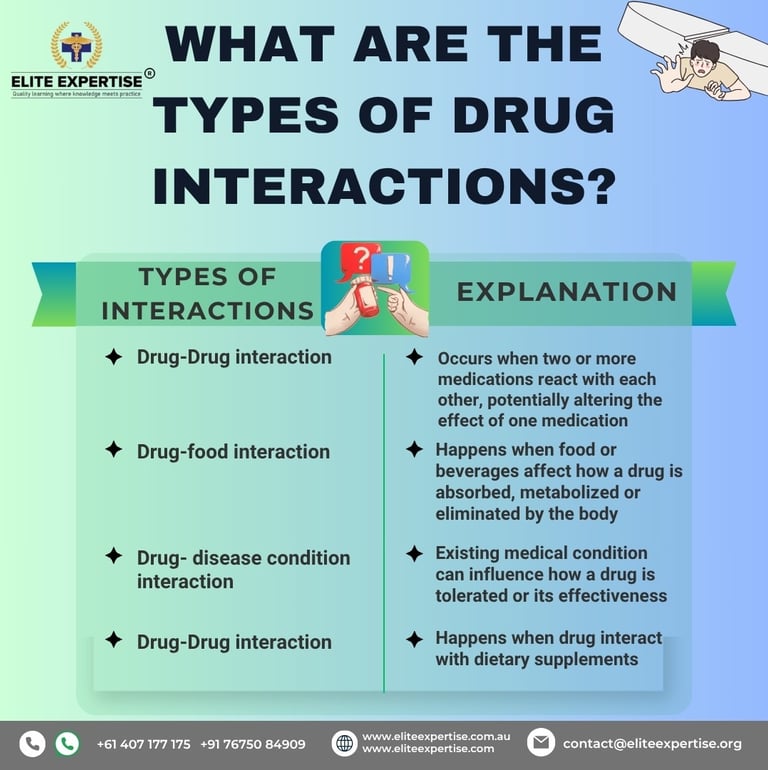ASK MY PHARMACIST | GOT QUESTIONS? Your pharmacist has answers. Click Here
Drug interactions - OPRA Exam Pharmacology Guide
Ace the OPRA exam with this focused guide on drug interactions. Learn the most tested interaction types, clinical examples, and prevention strategies pharmacists must know.
Krupa
7/5/20253 min read


Drug Interaction Pharmacology (Made Easy) OPRA Exam Pharmacology Guide
Drug interactions are one of the most frequently tested areas in the OPRA exam, and for good reason, they play a crucial role in patients safety and clinical decision making. Understanding how drugs can interact with one another ( with food and certain disease conditions) is essential for any practicing pharmacists. In this guide we are breaking it down in the simplest way possible.
Whether you are revising for the OPRA exam or cultivating clinical knowledge, this guide will make drug interaction topics easy to remember and apply.
What are drug interactions?
Drug interaction occurs when the effects of a medication are altered by the presence of another substance, such as another drug, food or supplements. These interactions can either increase or decrease the effectiveness of a drug or lead to unwanted side effects.
The outcome of the interaction can be beneficial, neutral, or harmful but in exam, it will be mostly focused on potentially harmful interactions


What are the types of drug interactions?
Few Examples of Drug interactions are
Sedatives and antihistamines: combining these can cause excessive drowsiness, and slow reaction times
Blood thinners and pain relievers: certain pain relievers like aspirin or ibuprofen can increases the risk of bleeding when taken with blood thinners
Grapefruit and statins: grapefruit can interfere with the metabolism of statins, potentially increase the risk of side effects
Alcohol and certain drugs: alcohol can intensify the sedative effects of certain drugs or cause adverse reactions
What are the consequences of drug interactions?
They can induce toxicity
Increase risk of side effects
Reduced drug effectiveness
Top 5 Drug interactions in a glance
How to prevent drug interactions?
Consult with a healthcare professional: before starting any medications, seek information from a doctor or pharmacist about potential interactions and measures to avoid those
Read drug labels carefully: pay attention to the warnings and interactions listed on the medication labels
Inform your doctor or pharmacist about all the medication and supplements that you use.
Consider using a drug interaction checker: Online AI tools can help identify the potential interactions. But it's always advisable to get professional help rather than relying on online tools .
Avoid alcohol and certain foods: some substance can always interfere with metabolism and absorption
What are the tips to master drug interactions for the OPRA exams?
Use charts and flashcards to memorise interaction
Group drugs by enzymes (eg: CYP450 inducers / inhibitors)
Practice clinical scenarios: OPRA focus mainly on case study based questions
Keep updated: some guidelines change with newer drug safety data
Elite Expertise : Your Partner in OPRA success
At Elite expertise, we specialize in preparing pharmacists for international licensing exams like OPRA, PEBC, PSI, etc. Our simplified pharmacology sessions break down complex concepts like drug interaction sinto easy to grasp format, using mnemonics, memory tricks and clinical case discussions
If you are aiming for OPRA success, Elite Expertise can guide you through every high yield topics, from beta blocker to CYP450 interactions with clarity and confidence
Conclusion: Drug interaction Don’t have to be difficult
If a candidate understands the basic types of mechanisms and clinical consequences of drug interactions, they become much easier to remember. And apply. Keep practicing, use relevant resources, and stay sharp with your OPRA preparations.
This blog is intended for informational purposes only and reflects the views of Elite Expertise based on publicly available information at the time of writing. While we strive to provide accurate and updated details regarding pharmacist career pathways abroad, regulations and licensing requirements may vary and are subject to change by respective authorities. Elite Expertise is not a migration agent or legal advisor and does not provide immigration, sponsorship, or visa services. We strictly offer coaching and educational support for licensing exams such as PEBC (Canada), OPRA (Australia), and TCQR (Ireland). For personalized immigration advice or legal consultation, please contact a licensed migration agent or relevant government authority.
⚠️ Disclaimer


About the Author
Krupa Karamchand
Content Writer | Elite Expertise
Krupa Karamchand is a B. Pharm graduate and KAPS-qualified pharmacist with over 7 years of experience in the pharmaceutical field. As an experienced SEO content writer, she combines her in-depth healthcare knowledge with proven digital strategies to create informative, engaging, and search engine–optimized blogs. Krupa is passionate about making complex medical topics easy to understand and accessible to all readers.
Follow On
Follow Us
+91 76750 84909
Privacy Policy | © 2025 Elite Expertise . All Rights Reserved.
ELITE EXPERTISE PTY. LTD (ABN: 15668292439) (ACN: 668292439)
Australian Statutory Education License: OPP 2025 ELITE EXPERTISE PTY. LTD
Disclaimer
Elite Expertise is an online education platform dedicated solely to providing coaching and preparation services for the OPRA, PEBC, PSI and PTE exams. We do not offer any sponsorship or migration services. All information provided on our platform is for educational purposes only and should not be interpreted as legal or immigration advice. For inquiries regarding sponsorship, visa applications, or migration services, please consult with licensed immigration professionals or relevant authorities.
Elite Expertise is a trusted and results-driven training platform specializing in preparation for international pharmacist licensing exams. Our comprehensive courses, expert instructors, and proven methodologies have helped countless pharmacy professionals achieve their goals and succeed in competitive regulatory exams. We are proud of our strong success rate and commitment to excellence.
Elite Expertise is an independent training provider. We are not affiliated with any global pharmacy regulatory authorities or official exam-conducting bodies.
Copyright © 2026 Elite Expertise. All rights reserved.
Address
Unit 1/73 Beverley St, Doncaster East VIC 3109, Australia
